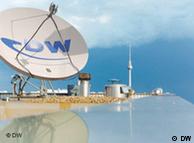By Patrick Galey
Daily Star staff
Monday, February 21, 2011
 Listen to the Article - Powered by
Listen to the Article - Powered by 
BEIRUT: Lebanese satellite news channels were hit as part of a sustained blocking attack which jammed several regional stations over the weekend, preventing the broadcast of pictures showing unrest and violence in Libya. Caretaker Telecommunications Minister Charbel Nahhas told The Daily Star that an organized and sophisticated blocking attack had prevented several channels, including NBN, Al-Jadeed and Al-Manar, from being viewed in Lebanon. He blamed officials in Libya for barring regional news channels, including Qatar-based Al-Jazeera television, which was also targeted. Two network providers – Arabsat and Nilesat – came under what an Al-Jazeera spokesperson called a “sophisticated” blocking attack late Friday, which involved scrambling certain channels’ frequency width. “The two networks have been subject to a blocking of emissions,” Nahhas said. “On Arabsat it was intermittent and we took measures to overcome the blocking. We reached an agreement with Arabsat to [broadcast channels] in different frequencies.” Caretaker Information Minister Tarek Mitri accused Libya of violating the right of Arab viewers to access information on region-wide protests. Hezbollah, which owns Al-Manar, slammed the “flagrant assault” on Lebanese media organizations. “It’s necessary that officials take measures to protect media corporations and prevent jamming assault to ensure their freedom and independence in doing their job,” the party said in a statement. The National Audiovisual Council (NAC) accused Libya of attempting to impose a media blackout to prevent the world seeing the atrocities its security forces are accused of perpetrating.
“The recent jamming that the Lebanese satellite channels experienced on Arabsat and Nilesat is considered piracy and a violation of freedom of the media and Arab viewers’ right to knowledge,” an NAC statement said.
“What the Libyan forces did … reveals [Libya’s] official stance in its involvement in the kidnap of Musa al-Sadr and this is more of a testament to their heinous acts and violations of normal values related to human rights, general freedom and dignity,” it added.
Sadr, the influential Shiite cleric, disappeared in Libya following a meeting with Gadhafi in August 1978. Relations between Libya and Lebanon have been frosty ever since his disappearance.
Libyan unrest has left over 100 pro-democracy protestors dead, according to human rights groups.
Bint Jbeil MP Hassan Fadlallah, president of the parliamentary Media and Communications Committee, met with Nahhas and NBN CEO Kassim Soueid to discuss solutions to the jams.
Nahhas said information available to his ministry suggested the blocking activity had come from Libya.
“The source of the blocking has clearly been organized. We understand that [jamming] originated in Libya and we asked Nilesat to remedy the situation,” Nahhas said.
He said his ministry had “strong” suspicions the jamming could have been sanctioned by the Libyan state.
News channels on Arabsat and Nilesat could be subject to blocking until the source of jamming frequencies could be properly identified, he added.
